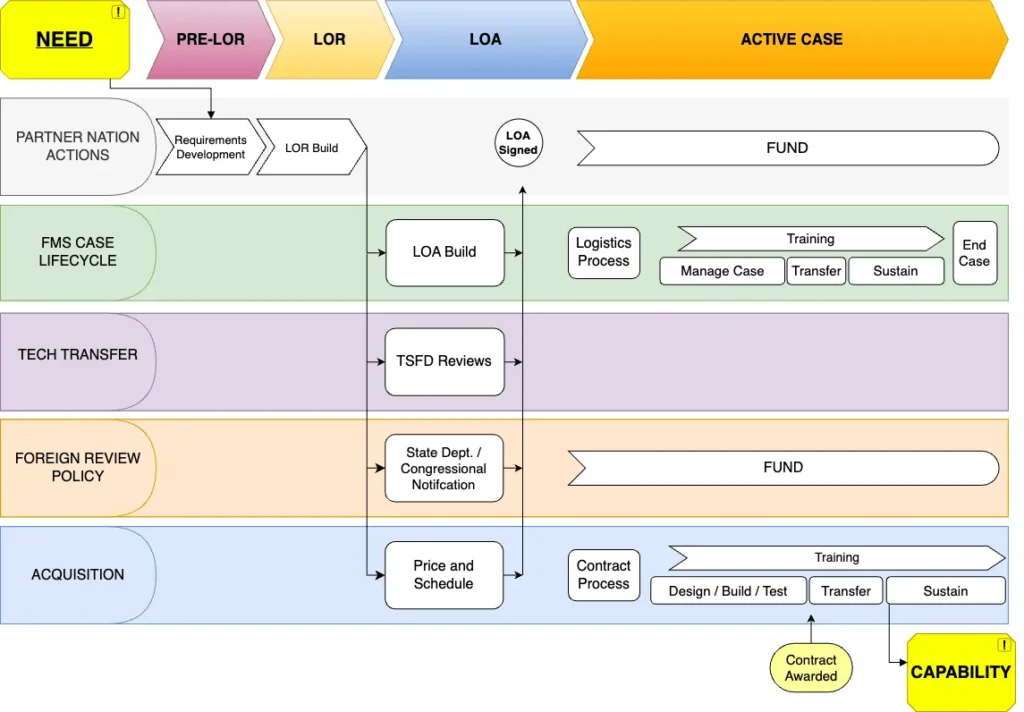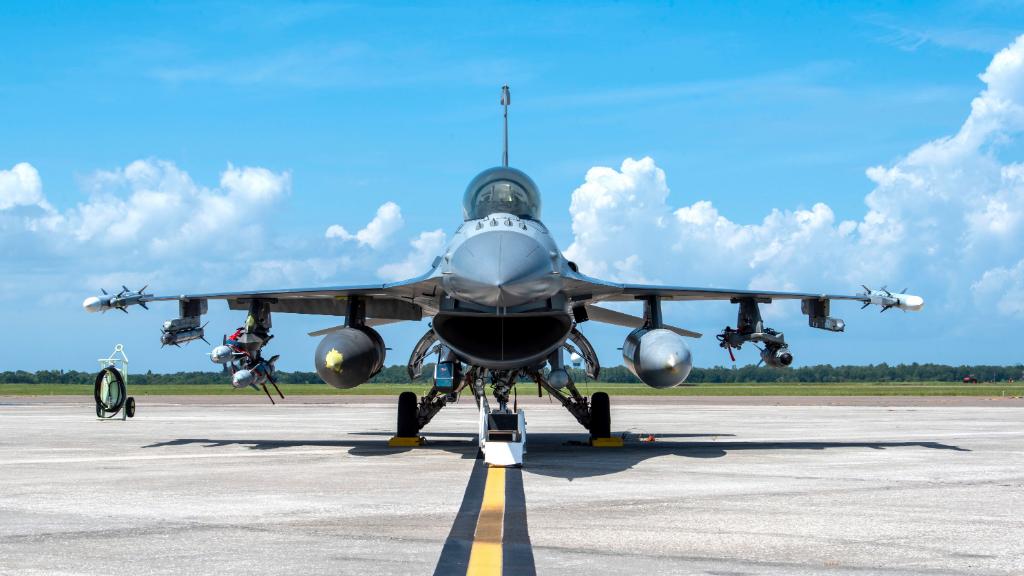About Us

“The total authorized value of implemented arms transfers and Security Cooperation programs for FY2023 was $80.9 billion…a record”
– Defense Security Cooperation Agency
Manufacturers of defense materiel around the world compete mightily to win their share of the $825 billion dollar US defense budget. However, little known is an additional $81 billion dollars in Security Assistance is provided to almost two hundred countries. If you produce materiel for any of these markets we may be able to help you.

Accessing the Market
Can you participate in this market and how?
Export Logistics USA provides support to companies around the world by
- training your sales force how to develop a case
- mentoring leadership in the process
- providing general guidance on timing and potential
“In fiscal year 2024 $80bn is committed to supporting our partner nations with materiel ranging from uniforms, fire and safety equipment, CBRN response, mobile artillery, civilian and military ships and aircraft, and just as important the training and spare parts needed to sustain”
Case Development
Set up a call with us today to discuss how we can help you start an FMS case and get your equipment into the FMS enterprise.
Stakeholders
The Defense Security Cooperation Agency administers all Foreign Military Sales cases but they don’t work alone! US Congress, US State Department, and much of the Department of Defense are involved in supporting partner nations to enhance global security.
Major USG Stakeholders in SC
Major U.S. Government Stakeholders in Security Cooperation (SC):
There are a great many U.S Government (USG) organizations involved with various aspects of SC. The below list, while not all-inclusive, highlights some of the key stakeholders. See [SAMM Section C1.3.](http://www.samm.dsca.mil/chapter/chapter-1#C1.3.) for a more extensive description of USG responsibilities and relationships related to Security Assistance.
Geographic Combatant Commanders (GCCs)
The Geographic Combatant Commanders (GCCs) develop military campaign plans to conduct SC programs and provide the appropriate assistance as requested by USD(P) or DSCA. The GCCs supervise SC Officers at embassies within their regional area of responsibility in matters related to execution of the Guidance for Employment of the Force, including the provision of necessary technical assistance and administrative support.
MILDEP Case Manager
Each MILDEP assigns a Case Manager to serve as the focal point for a given SC case. More than one Case Manager at a MILDEP may be assigned for separate SC cases involving different programs (e.g., one Navy Case Manager for a riverine boat purchase and another who manages a Navy aircraft case for a partner nation).
MILDEP Country Program Director
The MILDEP will also have a Country Program Director responsible for overseeing that MILDEP’s security cooperation relationship with partner nations. To continue the previous example, the Navy Country Program Director would be responsible for monitoring and facilitating the progress of both Navy SC cases – riverine boats and aircraft.
There are also other, more specialized, Implementing Agencies such as the National Geospatial-Intelligence Agency (NGA), the Defense Logistics Agency (DLA), the Missile Defense Agency (MDA), and the National Security Agency (NSA). A complete list of Implementing Agencies, and their contact information, can be found in SAMM Table C5.T2.
Security Cooperation Organizations (SCOs)
SCOs are comprised of U.S. military and DoD civilian personnel stationed overseas to manage security cooperation programs. SCO personnel work in most U.S. embassies around the world. SCOs possess a wealth of knowledge and can contact subject matter experts in specialty areas to respond to detailed or technical questions partner nations may have. SCOs may be contacted through the Defense Attaché Office at U.S. embassies. A list of all U.S. embassies and links to their websites can be found at [https://www.usembassy.gov/.](https://www.usembassy.gov/)
Security Assistance Training Management Organization (SATMO)
The Security Assistance Training Management Organization (SATMO), located at Fort Bragg, NC, leads the Army Materiel Command’s Security Assistance Enterprise training programs. SATMO plans, forms, prepares, deploys, sustains, and redeploys tailored CONUS-based Security Assistance teams to execute missions worldwide. SATMO advises and recommends Security Assistance related training solutions to U.S. Diplomatic Missions in order to build appropriate partner nation security sector capacity, support Theater Security Cooperation programs and strengthen U.S. global partnerships.
U.S. Army Corps of Engineers (USACE)
The U.S. Army Corps of Engineers (USACE), headquartered in Washington, DC, is responsible for Letter of Request receipt, Letter of Offer and Acceptance development/implementation, and the execution of facility infrastructure design and construction for Security Assistance, Building Partner Capacity, and Foreign Assistance Act Section 607 programs using SC. USACE provides services that include, but are not limited to, planning, design, construction, and technical assistance in the areas of infrastructure, water resource management, environment and sustainability, program/project management, geospatial/engineering, and sustainment.
Other DoD organizations that play an important role in SC include:
SCOs are comprised of U.S. military and DoD civilian personnel stationed overseas to manage security cooperation programs. SCO personnel work in most U.S. embassies around the world. SCOs possess a wealth of knowledge and can contact subject matter experts in specialty areas to respond to detailed or technical questions partner nations may have. SCOs may be contacted through the Defense Attaché Office at U.S. embassies. A list of all U.S. embassies and links to their websites can be found at [https://www.usembassy.gov/.](https://www.usembassy.gov/)
Security Assistance Training Management Organization (SATMO)
The Security Assistance Training Management Organization (SATMO), located at Fort Bragg, NC, leads the Army Materiel Command’s Security Assistance Enterprise training programs. SATMO plans, forms, prepares, deploys, sustains, and redeploys tailored CONUS-based Security Assistance teams to execute missions worldwide. SATMO advises and recommends Security Assistance related training solutions to U.S. Diplomatic Missions in order to build appropriate partner nation security sector capacity, support Theater Security Cooperation programs and strengthen U.S. global partnerships.
U.S. Army Corps of Engineers (USACE)
The U.S. Army Corps of Engineers (USACE), headquartered in Washington, DC, is responsible for Letter of Request receipt, Letter of Offer and Acceptance development/implementation, and the execution of facility infrastructure design and construction for Security Assistance, Building Partner Capacity, and Foreign Assistance Act Section 607 programs using SC. USACE provides services that include, but are not limited to, planning, design, construction, and technical assistance in the areas of infrastructure, water resource management, environment and sustainability, program/project management, geospatial/engineering, and sustainment.
Other DoD organizations that play an important role in SC include:
- The Defense Contract Management Agency (DCMA), which performs contract administration and management, quality assurance and inspection for the DoD, including contracts that support SC cases;
The Defense Contract Audit Agency (DCAA), which performs all necessary contract auditing for the both DoD purchases and SC cases; and
The Defense Finance and Accounting Service (DFAS) which is responsible for accounting, billing, disbursing and collecting functions for the SC program.
Credit: Defense Security Cooperation Agency
